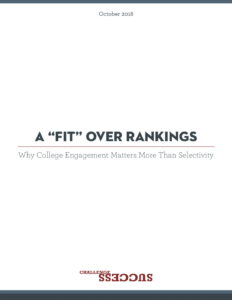In what ways do college selectivity and rankings matter? A non-profit associated with Stanford’s Graduate

School of Education conducted a deep dive study into “fit” over “rankings” and why being engaged in college matters more than attending a selective college.
SocratesPost reviewed and summarized this 22-page white paper so you can learn the empirical data behind selectivity and fit.
Here are 3 questions answered by the study.
- Do rankings define quality of education?
- Does college selectivity predict learning outcomes, job satisfaction, or well-being?
- What’s more important than the selectivity of the college I attend?
Here are our answers:
1. Do rankings define quality of education?
No. According to the study, “traditional college rankings measure a set of factors that are weighted arbitrarily, drawn from data that are most easily quantifiable and comparable, sometimes poorly documented, and not always relevant to undergraduate education. There are better ways to choose a college than to rely on rankings and selectivity as the main criteria” (9).
SocratesPost did a dive into the methodology behind popular college ranking publications. Check it out here.
2. Does college selectivity predict learning outcomes, job satisfaction, or well-being?
No. Ohio State professor and higher education researcher Matthew Mayhew reviewed over 1,800 peer-reviewed studies on the effects of selectivity on college results. Here’s the biggest takeaway:
“Little evidence suggests that selectivity is related to measures of students’ self- reported gains in learning, let alone verbal, quantitative, or subject-matter competence measured by standardized tests. This finding, which has been consistent over the past 40 to 50 years, has implications for college choice, family finances, and public policy, particularly as students, their families, and policymakers deal with the differential allocation of resources of publicly supported institutions. Accounting for student background characteristics, the weight of evidence simply does not support students’ or policymakers’ beliefs that a selective admissions process enhances student learning. (p. 96)” (10).
3. What’s more important than the selectivity of the college I attend?
Engagement with the college you end up attending. According to the Challenge Success white paper which cites multiple studies, “effort put into coursework results in increased subject-matter competence and general knowledge (Berger, 2002; Rocconi, 2011). Engagement with coursework also increases curiosity, creativity, and initiative (Pike et al., 2012). Unsurprisingly, the more students study, and the more intentional their use of study skills, the better students do in their courses (Arum and Roska, 2011; Johnson and Kuennen, 2004; Stump et al., 2011).”
